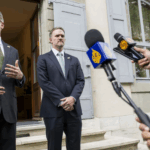The Social Market Foundation (SMF) has released a report recommending a substantial increase in the Remote Gaming Duty from the current 21% to 42%. This proposed change could potentially generate up to £900 million for the UK Treasury, as the country grapples with a £22 billion fiscal shortfall.
The report, authored by Dr. James Noyes and Dr. Aveek Bhattacharya, highlights the increasing financial burden associated with online gambling, particularly in the realm of casino gaming, which has been linked to heightened rates of gambling-related harm. Fiscal costs associated with this issue are estimated to exceed £1 billion, prompting calls for a reevaluation of how the sector is taxed.
The authors argue that the online gambling sector is currently undertaxed compared to its counterparts in other countries, where operators face higher tax rates. They contend that the UK government has a significant opportunity to modernize its outdated tax system while addressing the social costs tied to gambling, including addiction and related health issues.
In recent years, the surge in online gambling, accelerated by the pandemic, has raised concerns about its impact on public health. Many experts believe that the current tax framework does not adequately reflect the economic and social implications of the industry. By increasing the Remote Gaming Duty, the government could not only bolster public finances but also invest in programs aimed at mitigating gambling-related harm.
The report emphasizes that the increased tax revenue could be earmarked for initiatives designed to support those affected by gambling addiction, funding education and treatment programs, and improving resources for gambling harm prevention.
Critics of the current tax structure argue that the existing rates do not align with the industry’s rapid growth, leading to a disconnect between the benefits enjoyed by operators and the social costs incurred by society. The SMF’s recommendations aim to bridge this gap by ensuring that the online gambling sector contributes its fair share to the economy while addressing the negative consequences of its activities.
As the government seeks to address its fiscal challenges, the SMF’s report may serve as a catalyst for discussions about reforming gambling taxation. With the potential to generate substantial revenue while prioritizing public health, the proposal could reshape the landscape of online gambling in the UK for years to come.
As stakeholders from various sectors weigh in on the report’s findings, the debate over how best to regulate and tax the online gambling industry is set to intensify, highlighting the complex interplay between economic opportunity and social responsibility.









